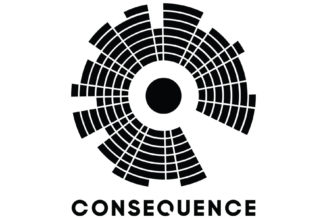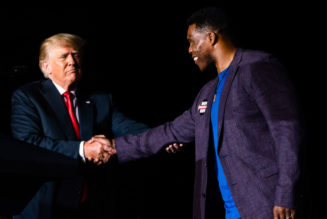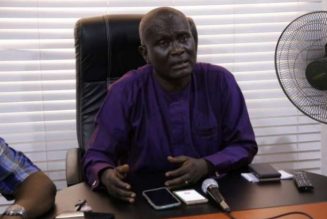
This week on The Trip podcast: Zoltan Istvan has come from the future with a message New Hampshire doesn’t want to hear.
Here they are in the New Hampshire Secretary of State’s office, paying their thousand dollars to be on the official primary ballot. They are the lesser-known candidates, the dramatic fringe of each presidential primary election up here. And they are the stars of my quadrennial quixotic reporting project with photographer Shane Carpenter. And listen, they aren’t like Tom Steyer lesser-known, they’re like Vermin Supreme lesser-known, Mary Maxwell lesser-known, Zoltan Istvan lesser-known. Almost nobody knows these people, but they’re running anyway. This is the fifth primary that Shane and I have spent ducking out of mainstream campaign press events to track down the people who are just obsessive, idealistic, or imbalanced enough to think they should run for president, often with no money, no support, sometimes no platform really. Of course, the idea of a non-politician becoming president was distinctly more laughable before 2016, and now it doesn’t seem that funny at all. But these candidates are something different, a wild bunch, far more entertaining and thought-provoking even than the scripted candidates. Shane and I just published a feature on the lesser-known and their radical approach to democracy on roadsandkingdoms.com; I hope you’ll take a look. But for now, in this episode, I’ve got one of the most composed and compelling of this year’s fringe candidates, writer and transhumanist Zoltan Istvan. We drank some 15 year old Dalwinnie Scotch and talked about exoskeletons, being escorted at gunpoint from a megachurch, and why he let someone jam a horse syringe into his hand to give him a permanent bio-chip implant.
Here is an edited and condensed transcript from my conversation with Zoltan. Subscribers can listen to the full episode here. If you’re not on Luminary yet, subscribe and listen (and get a 7-day free trial) by signing up here.
Nathan Thornburgh: What is transhumanism?
Zoltan Istvan: Transhumanism is a social movement, now of many millions of people around the world, that want to use science and technology to radically transform the human body and transform the human experience. Anything from exoskeleton suits to brain implants to even driverless cars. But whatever it is, it’s kind of the top 10% of the most radical technologies that are affecting the human race.
Thornburgh: You say there were many millions. Are these people who would actively knowingly define themselves as transhumanists, or you think it’s just aligned with the way that they look at the world?
Istvan: I think there are now probably millions that would say, if you ask them are you a transhumanist, they would now say, yes I am. When you ask them, is that what they consider themselves? That’s a little bit more challenging of a question. Google, for example, is probably the most transhumanist of all the companies out there, and they have the largest, what we call life extension company, a company worth billions of dollars, that wants to overcome aging. It’s specifically designed to make people essentially live indefinitely. So we are getting to a point when you can now say millions and likely tens of millions who are supporters of the idea. China’s probably leading the transhumanist movement in terms of innovation—they have the first designer baby babies and stuff like that. So there might be even many more.
But the word is just an umbrella term for many other ideas. Cryonics, singulariatism. Cyborgism. Singularity is the concept of transhumanists where they believe that AI will become so sophisticated that our human brains won’t even be able to understand its sophistication. And at that point we get left behind.
The main goal of transhumanism is overcoming death with science and technology.
Thornburgh: The word itself, can you just break it down for me?
Istvan: Well, the Latin would say it’s “beyond human.”
Thornburgh: Okay, got it. All of our limitations are physical—chronological aging, mortality. Those are the things that you’re going to supersede through technology.
Istvan: Basically, yes. And nobody’s really sure like exactly what transhumanism means in terms of the specific agenda. Is it when a primate picked up a rock and made an axe millions of years ago, or is it a robot taking over a worker’s job, which of course is increasingly happening. Is that transhumanism, or is it brain implants? Nobody really knows, but whatever it is and it radical science is, is sort of changing the human species and the core of it is the microprocessor. It keeps evolving exponentially and we even have things like quantum computing now happening where, you know, that could revolutionize again, the microprocessor. So anything that applies to the human being, in terms of merging us with machines, is a transhuman event.
I think what’s very important is that there are various versions of transhumanism. There are socialist transhumanists, there are libertarian transients like myself, and there are transceivers party transhumanism. Of course, I’m, I’m the founder of the transceivers party, but I’m also now running as a Republican. But I’ve also run as a libertarian, I’ve said openly, I might run as a Democrat in the future. For me, it’s about the seed of transhumanism. You can take it whichever political way you want. There’s also Christian transhumanism, there’s Buddhist transhumanist. So we want a worldwide movement. I want different factions. I want a decentralized idea of it. And I hope to influence it in terms of it grows and grows and grows. Because you have to understand about 80% of the world’s population believes in an afterlife. The main goal of transhumanism is overcoming death with science and technology. We’re fighting 80% of the population. So it’s very important that we coalesce together as a movement that says we need to change that 80%. We need to change their mindset. And that’s really where the cultural reform comes in, and why it’s so important to have a huge movements like environmentalism, where the trajectory is that one day we also become a billion person movement that really wants to move beyond our cultural heritage.
Thornburgh: So let’s, let’s posit success and you reach those 80% and flip them into transhumanists. What will that actually mean? Does that mean that they will vote for people who pour more resources into death-defying technologies or pass laws? What, practically, would having people be fired up about transhumanism do?
Istvan: That’s the best question. The great question. That’s exactly what I’m trying to do. My main goal here with running for office and my main goal of spreading transhumanism is to get more money into the hands of the scientists who are making the movement happen. You have to understand, right now our United States Congress, all 535 members, all nine Supreme Court justices, believe in an afterlife, and they say they believe in God, so they have no real reason to pass laws to put money into the hands of the scientists who want to end aging and live indefinitely and upgrade ourselves to this new bionic future. Now the problem with that is if the entire government doesn’t want to give money to it, it doesn’t happen. Really only private industry does it. We need an American culture on board with transhumanism.
I run for office in hopes of saying, look, instead of giant military fighting warrants in Afghanistan and Iraq, we’re going to take that money and put it into creating a science-industrial complex in America dedicated to ending aging and upgrading the human being. It’s a very different kind of way. I’m interested in American healthcare, in terms of eliminating disease. And that’s a very transhuman idea that our president right now doesn’t share. A president who’s cut the budget of the National Institute of Health.
I’m running because, ultimately, I think that Trump has failed the most important part of America: the science and innovation part.
Thornburgh: You’re running as a Republican. This is your opponent.
Istvan: You gotta you gotta hit them hard on that. One thing Trump has done that hasn’t been great is he’s not only cut the budget of the National Institute of Health, but he hasn’t made a culture where science really thrives. In China, it’s thriving. China’s our main kind of competitor at this point. So probably within five years, China lead the world in AI and genetic editing. It’s game over for America in terms of leadership, and who wants not authoritarian nation to be leading the world and in science and technology. So this is where I really fault Trump. In fact, this is why I’m running. This is the singular reason I’m running because, ultimately, I think that Trump has failed the most important part of America: the science and innovation part.
Thornburgh: What is your background? Take me way back.
Istvan: My career really began after I graduated from Columbia University, and I went into journalism at National Geographic. And so for five years I traveled around the world and I wrote something like 50 or 60 articles for their website, and also was on their National Geographic Today, show, doing a lot of documentary work. It was a great time in my life. I was in my twenties, I covered a lot of conflict zones, so saw some horrifying things. In Vietnam I was covering the demilitarized zone 20, 30 years after the war. And there’s a bunch of rice farmers that now dig up bombs that were dropped in Vietnam from Americans, but they’re unexploded. They sell the metal. But to get there you have to go through these landmine-infested jungles. And I almost stepped on one. It freaked me out because my guide had to throw me out of the way and pointed to the ground. And after covering war zones for a while kind of gets in your head. And it was that moment in Vietnam when I said, you know, I’m going to stop being a journalist and I’m going to do something to try to overcome death. And of course transhumanism has been an ongoing movement since the 90s, and that’s their primary job. Their primary purpose is to use science to overcome death.
Istvan: So I came home, joined the movement, wrote a novel, the novel did really well. It was called The Transhumanist Wager, became a bestseller, and it launched my career as a public figure. And because I was a journalist, I began writing some of the very first transhumanist columns. So I’ve had an ability over six years to write over 230 opinion pieces and essays for major media, almost cheerleading transhumanism. Up until that point, no one had ever been optimistic about it. People had been kind of skeptical.
Thornburgh: That literally came from a near-death experience that you had.
Istvan: It’s based on two or three years of covering other conflicts. I’d covered the Sri Lanka conflict. I covered the Kashmir conflict between Pakistan and India. I’d been doing some pretty harrowing stories and it made me, I think it kinda got in my head, I don’t want to say it’s PTSD, but really it made me think, What if we could overcome death? And when it hit me that I could do this, I realized that this is why I want to dedicate my life to.
Thornburgh: Does transhumanism have any rights or rituals or holidays?
Istvan: It’s secular. It’s a very decentralized movement. A lot of the life-extension people are not interested in the robotics people, because life extension people want to biologically live longer, where the robotics people want to become machines and upload themselves. So even though they are both transhumanist and I like both groups, they don’t really talk to each other. Then there are the biohackers, who are mostly young, tattooed people that are putting chips in. I have a chip in my hand. It opens my front door, starts a car, it sends a text message.
Thornburgh: You have this right now?
Istvan: I have it right now. You can touch it. It’s right there. Push. You’ll see. You’ll feel a bump. It’s a glass-enclosed microchip.
Thornburgh: Does that hurt when I press your chip?
Istvan: No. It’s tiny. It’s the size of a grain of rice. When you get these chip implants, you use a horse syringe you just put it in. It’s kind of painful. But the chip itself is about the size of a grain rice.
Thornburgh: But that wasn’t sexual what we just did?
Istvan: No. It’s just a chip.
Thornburgh: How do you program this chip? Is this like a radio-frequency identification?
Istvan: Yeah. Unfortunately, the technology doesn’t work with Apple phones, but it works with all Android. And so if you have an Android phone, you will actually be able to put it against my hand and then get my serial number. Of course, that freaks people out, because who has a serial number? But you can also put in medical information. So if you’re unconscious and they find you, they can scan it. But in my case, I’m a surfer and a jogger and when you go surfing you have to always hide your keys, and what a pain in the butt that is, because then someone can steal it when you’re surfing and take your car. So in my case, it’s just great because all my keys are embedded into my hand and you can even do things like hold Bitcoin on it, but you can’t pay it Starbucks yet.









